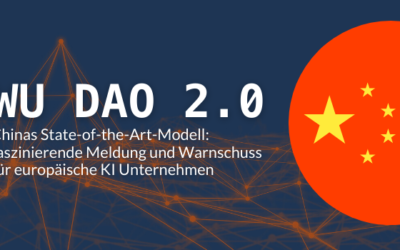Artificial intelligence represents an important technology for the next stage of automation, because it has the potential to profoundly transform structures and processes in different fields of action.
However, especially in the SME sector, many companies are not yet fully aware of this enormous potential or do not have the necessary resources to implement corresponding projects. There is a massive need to catch up here in order to be able to use the opportunities that arise from AI.
Inhaltsverzeichnis
AI only for large corporations?
The application areas of AI have been developed in increasingly differentiated forms in recent years. This enables a worthwhile use more and more also for non-tech companies. Today, companies are faced with the task of fully exploiting the existing potential.
However, in public and also in many companies, the view prevails that AI is primarily relevant for large corporations. In contrast, AI in SMEs has so far been a niche topic - despite the immense potential of corresponding applications for SMEs. This is not least due to a lack of sensitivity for digital topics. In addition, there is often a certain reluctance to expand personnel capacities and competences in the area of artificial intelligence.
AI in SMEs - why so hesitant?
In November 2018, the German government published its strategy for the development and application of AI. Among other things, public funds amounting to three billion euros are to flow into AI research centres and AI applications in the economy by 2025. In international comparison, this initiative comes late: countries such as China and the USA are significantly further ahead in terms of AI applications.
AI in SMEs has played virtually no role in Germany to date. A 2018 study by the consulting firm pwc with 500 decision-makers from the private sector shows that AI was only being used in 4 percent of companies at the time of the survey. A further 2 percent were in the process of implementing AI applications. Corresponding planning or testing was indicated by 17 percent of the respondents. 28 per cent of the respondents considered AI to be significant, but do not want to use corresponding technologies in their own companies.
It was particularly worrying that 48 percent of the study participants thought that AI had no relevance for their own company. Such a marginal position of AI in SMEs could lead to many companies losing part of their competitiveness in the future. More optimistic are the results of a Deloitte study on "AI in SMEs", which was surveyed in October and November 2020. For this purpose, 307 managers from SMEs were surveyed. In this survey, too, German SMEs are said to have some catching up to do in terms of AI: 30 percent of the respondents assume that AI is at best of medium relevance for SMEs, and 34 percent attribute hardly any importance to it. However, 59 percent of them also believe that the relevance of AI will grow significantly in the future.
Digital maturity has a positive impact on AI in SMEs
According to Deloitte, the decisive factor for the relevance of AI in SMEs is the digital maturity of the companies surveyed. Companies with a high level of digitalisation are also more open to the application of AI. One of the key findings of the study is that 86 percent of the companies state that AI is important for the development of new business models. In the other two groups (companies with a medium or low level of digital maturity), only around 40 percent of respondents in each case attest to the associated potential of AI applications.
In its current edition 2020/2021, the "Digitalisation Index for SMEs" shows that the digital transformation in SMEs is currently being driven significantly by the Corona crisis. The level of digitalisation in these companies has increased by two index points compared to the previous survey (2018/2019). The digital leaders proved to be more productive and crisis-resistant under the conditions of the pandemic. As a consequence, four out of ten companies want to invest in digital technologies. For many companies, the expansion of AI is also gaining importance in this context.
Where is AI being used in SMEs?
Among other things, the pwc survey refers to possible fields of application for AI in SMEs. The participants in the study were asked to name AI applications that are used in their companies or that they consider relevant:
- 70 % of respondents consider AI to be important as a basis for data analysis in decision-making processes.
- 63 % believe that AI supports the automation of existing business processes.
- 47 % assume that AI can be used in the deployment of chatbots.
- 44 % think that AI could give rise to new business models.
- 42 % consider Speech Processing (the digital processing of speech signals) as a relevant field of application.
- 39 % indicate that AI could become part of new products and services.
The Deloitte study also states that there is no uniform understanding of AI in medium-sized companies. The focus is on independent decisions by computers or digital routines, automation and process optimisation as well as the transfer of intelligence and knowledge.
Only 9 per cent of respondents state that AI is about the use of algorithms and have thus grasped an essential basic principle of current AI applications. 8 percent equate the use of AI with the general process of digitalisation. Only 22 percent of the companies attest to a high level of digital maturity. Rule-based systems, machine learning and deep learning are considered relevant technologies.
The companies surveyed for the Deloitte study see advantages of AI primarily in the "team play of humans and machines", in the automation and acceleration of processes, and in the efficient use of data. Companies with a high level of digital maturity set identical priorities, but also cite the importance of AI for the development of new business models.
AI fields of application along the entire value chain
In fact, AI is capable of optimising value creation processes comprehensively in different fields of action and across companies. Artificial intelligence is important for the design of production, supply chains, logistics systems, but also in the
customer management and for the provision of personalised services.
The two studies cited by pwc and Deloitte show that companies are far from being fully aware of the potential of AI - and even if they are, they often lack the necessary know-how to develop a strategy for implementing AI-supported systems that is tailored to their own business areas. Industry 4.0 - autonomous interactions of machines with each other and between people and machines and self-controlling production processes. This field of application is of particular importance for the study participants from SMEs. With the question of how a Smart Factory The question of how AI works and how it can be established in practice is something that manufacturing companies must fundamentally address today. It is to be expected that AI in SMEs will gain greater relevance in the first step, especially in the manufacturing industry.
AI-based solutions for SMEs tend to encompass all product-related processes - product ideas and development, procurement of all necessary components, production, marketing and sales, as well as customer service and recycling.
In the future, there must be a stronger focus on customer-related applications of AI in SMEs for the realisation of data-driven business models.
AI in SMEs - the biggest challenges
One challenge for SMEs is the lack of skills for AI applications and the use of big data: Value creation networks in which external partners with technology and data expertise are integrated. This breaks up rigid, linear value chains - a requirement that is important for all corporate activities in the process of digital transformation. Other challenges are error-free data quality, reliable data management and Data security and in effective control, efficiency and compliance processes.
For many companies in the SME sector, it is currently difficult to assess the risks associated with AI and to deal with them in practice. Ethical considerations also play a role for the decision-makers in the companies. This corresponds to the fact that AI in SMEs should primarily support and facilitate human work. In the pwc study, 71 percent of the respondents state their preference for this approach, only 20 percent of the study participants are of the opinion that AI in SMEs should lead to the use of autonomously acting digital systems.
Identifying potentials, mastering challenges - how AI becomes a reality in SMEs
Medium-sized companies face challenges in the use of AI, the mastering of which is of elementary importance for the long-term preservation of their competitiveness. Many companies are entering uncharted territory due to their low level of digitalisation.
The results of the studies listed clearly show that companies are well aware of the associated challenges and the importance of AI, but the majority are not yet taking any concrete steps in this direction.
In this context, it can be decisive to recognise one's own potentials in time, to react strategically accordingly and to further optimise and advance measures already taken - by expanding staff internally and/or by means of external expert teams.
State initiatives for the transfer of AI research results to the economy and for the reduction of market barriers are increasingly lowering the hurdle for the successful use of AI in SMEs. In addition, SMEs can rely on information and advisory services as well as on the support of specialised AI consulting firms.








0 Kommentare